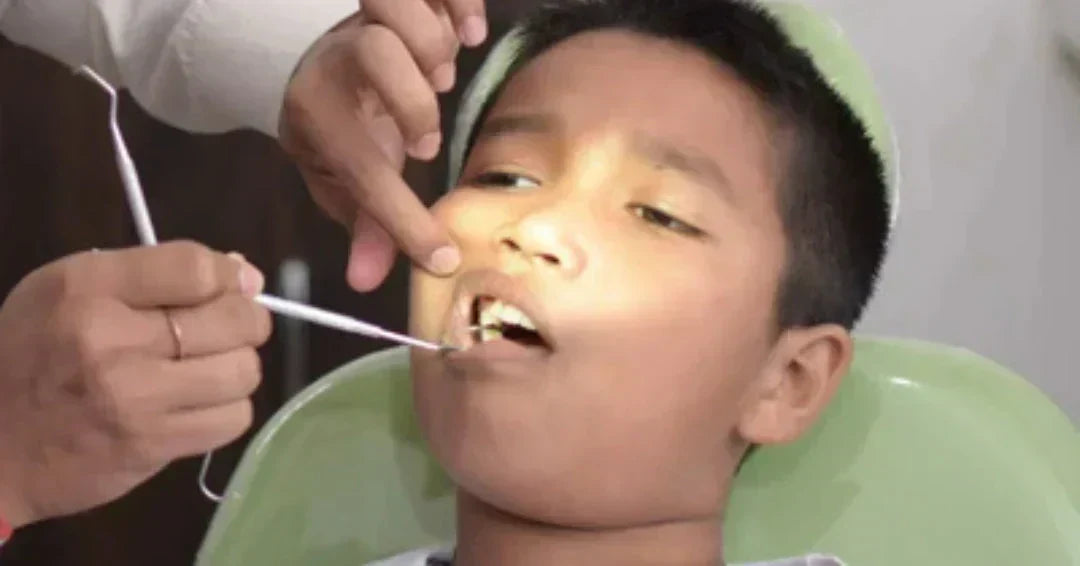Stepping into a dentist's office can feel strange and scary, especially for little ones who are heading in for their very first examination. Not knowing what will happen during a checkup or a treatment can definitely make them feel uneasy. Plus, a dentist's office is a busy place that sends some toddlers into sensory overload. The bright lights, the whirring and sucking sounds, the distinct smells, and the strange feel of tools in their mouths can all feel like too much for some kids. Sitting in that big chair and having to open wide for someone they do not know can also make them feel a little helpless. Here are some tips to help children who are anxious about their first visit with the dentist.

Guidance for a Child's First Dental Exam
By the time a child turns 1, or within six months of the first tooth eruption, you should take your toddler to the dentist. This is the advice of the American Academy of Pediatric Dentistry. By the time your child is 2, you should begin the routine of dental checkups every six months. Then around 4 years of age, the dentist will begin doing more in-depth examinations that include taking x-rays to identify signs of cavities lurking between the teeth and in those hard-to-reach molars that have appeared. By the time kids are 5 or 6, they can expect to start losing their baby teeth and, if they're lucky, the tooth fairy will pay a visit!
Tips To Help Kids With Visits to the Dentist
Young toddlers and children will often experience anxiety and fear about the dentist, and when this happens, their behavior can greatly interfere with the dentist's ability to examine their teeth. It is not uncommon for toddlers to refuse to open their mouths, or when they do, to bite down during the examination. For this reason, it is important to do everything possible to prepare first time patients for an upcoming appointment. Reading children's books about the dentist featuring familiar characters going to get their teeth cleaned, is a good way to prepare your kids. Here are some additional tips for kids going to the dentist for the first time.

(1) Buy a pretend dentist kit for playtime before the first exam.
Go through all the basic parts of a routine dental exam like cleaning, flossing, checking for cavities and taking x-rays. If a child knows what to expect, the dental exam will be a piece of cake! Consider investing in some toy dentist kits and engage in pretend play with your little ones ahead of time so they have an idea of what to expect.
(2) Find a pediatric dentist with kid-friendly decor.
The first impression a child gets when they walk through the door should be one of warmth and friendliness. Look for a practice that has invested in creating colorful walls, with artwork and murals filled with images of animals or other fun figures. Dentist offices that have fun waiting rooms filled with games and televisions are good distractions for kids nervously waiting for their name to be called. The exam rooms should be equally inviting, bursting with color and fun music in the background.
(3) Let your child bring a personal object to the dental visit.
Even if you typically don't allow their stuffed animals to leave the house, you may want to make an exception for their first trip to the dentist. A favorite plush toy, blanket, or other snuggly toy will provide them with comfort and security for the duration of the exam.
(4) Make sure your child is well rested.
Don't schedule the visit during nap time or late in the day when bedtime is right around the corner. If possible, try to get the appointment out of the way first thing in the morning when your child is feeling good after a solid night of sleep. You'll find that the visit will go much more smoothly when crankiness is not a factor!
(5) Make sure your child has a full belly.
Just like lack of sleep, an empty belly will wreak havoc on a child's visit with the dentist. Feeding your child a hearty meal or substantial snack will keep the hangry feelings in check. Even if you plan to reward your child afterward with lunch at a favorite restaurant, don't bypass a meal before the appointment.
(6) Acknowledge and validate their anxious feelings.
Listen generously to everything your child has to say and do not dismiss their fears as silly or unfounded. Remember that there are plenty of adults who experience anxiety visiting the dentist, too. Let them know it's ok to be scared, but make sure to end the conversation on a positive note. Emphasize all the ways a dentist helps our teeth stay healthy, and that a short visit is a small price to pay for a beautiful smile.
(7) A little bribery can go a long way.
Let your child choose a favorite restaurant where you can go grab a bite to eat after the appointment. You may even need to offer up shopping trip to pick out a small toy. Kids can focus on all the fun that awaits after they get through the dental examination and cleaning.
(8) Let the dentist to take charge.
Anxious parents may feel the need to hover over the child and offer reassurances. While intentions are in the right place, parents are sending signals to the child that they need protection. This type of behavior will only increase the anxiety level in a child, adversely affecting the entire experience. Remember that pediatric dentists are professionals who know all the right things to say. Trust in them to guide their patient through the process.
(9) Read books with favorite characters visiting the dentist.
Just about every popular character in children's books takes a trip to see the dentist. Curious George, Dora the Explorer, Daniel the Tiger, Peppa Pig, The Berenstain Bears, and Pout Pout Fish are just a small handful of examples. Reading these stories ahead of time will open a conversation about what a child can expect. The characters share all the same worries, but in the end, their positive experiences will reassure your child that everything will be okay.
(10) Reinforce good dental hygiene at home.
Even when the experience is no so terrible, kids will be in no hurry to return for another dental examination or treatment. This is a fantastic time to drive home the importance of brushing teeth multiple times a day and flossing regularly. Prevention is key to minimizing uncomfortable procedures and the anxiety that comes along with them. Grab a few children's books about brushing teeth to help educate and reinforce healthy habits.





